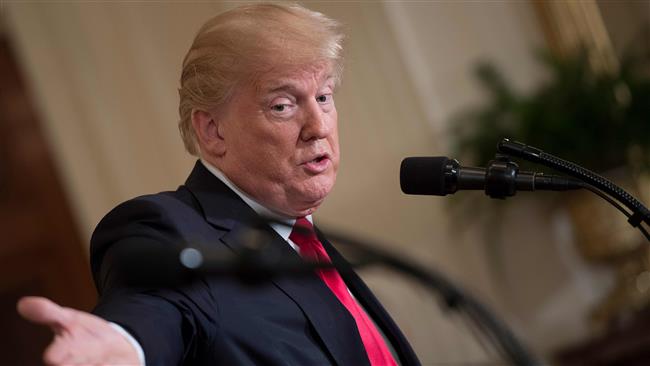White House rejects Trump's North Korea quote as fake news
The White House denies that President Donald Trump has suggested he had good contacts with North Korean leader Kim Jong-un.
On Thursday, The Wall Street Journal quoted Trump as saying in an interview that "I probably have a very good relationship with Kim Jong-un," but the paper refused to confirm whether the two had spoken.
"I have relationships with people. I think you people are surprised," the paper said.
However, Press Secretary Sarah Sanders issued a Twitter meme on Saturday, insisting that Trump was misquoted.
"President Trump said, I'D probably have a very good relationship with Kim Jong Un of North Korea. I'D -- I'D -- I'D. NOT I!" the message read, with "I'D" in red ink, under a red banner reading "FAKE NEWS."
Sanders mockingly mimicked the newspaper's front page, saying, "THE WALL STREET JOURNAL -- FAKE NEWS IS AT IT AGAIN! -- FALSELY QUOTING PRESIDENT TRUMP."

During the interview, Trump also was asked whether he had spoken to Kim, responding to which he said, "I don't want to comment on it. I'm not saying I have or haven't. I just don't want to comment."
This comes a few days after Trump said that he was willing to hold talks with North Korea.
"Sure, I always believe in talking," Trump told reporters at Camp David last Saturday. "Absolutely I would do that. I wouldn't have a problem with that at all."
Tensions are running high between Washington and Pyongyang over North Korea's missile and nuclear programs.
The Trump administration claims it prefers a diplomatic solution to the crisis, but it also says that all options are on the table, including military ones.
Washington insists that any future talks should be aimed at North Korea giving up its nuclear weapons, something Pyongyang rejects.
Next week, the US and Canada will host a meeting on the nuclear standoff with Pyongyang in Vancouver. China has slammed the meeting and will not attend it.
North Korea has been under a raft of harsh UN sanctions since 2006 over its nuclear tests as well as multiple rocket and missile launches. Pyongyang has firmly defended its military program as a deterrent against the hostile policies of the US and its regional allies, including South Korea and Japan.
Iranian diaspora in EU, UK deplore ban on national airline
VIDEO | Press TV's News Headlines
Israel’s military struggling with shortage of troops: Report
Iran calls for more efforts to establish peace in Gaza, Lebanon
Israel targets journalists in southern Lebanon to mask atrocities
Trump vs Harris: A choice between two deranged war hawks who cheer genocide in Gaza
Over 1,800 Palestinians killed in Israel’s month-long attacks in northern Gaza
UN official urges Egypt to seize Israel-bound arms ship MV Kathrin











 This makes it easy to access the Press TV website
This makes it easy to access the Press TV website